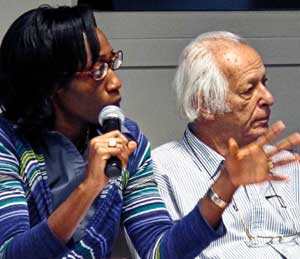Marxist ‘think tanks’ find no capitalist exit from world crisis
By
John Catalinotto
Brussels, Belgium
Published Nov 20, 2009 10:36 PM
Three Marxist “think tanks” met in Brussels from Oct. 28 to Nov. 1
for an international conference called “The Crisis and Beyond.”
They met both to characterize the nature of the crises on the world and its
people, and to suggest paths for their resolution.
Almost all conference speakers shared the analysis that the current crisis is
not simply a “financial crisis” or a “housing crisis,”
but a capitalist crisis of overproduction. They considered this a structural
crisis—that is, it will not go away with a cyclical upswing or recovery.
Many also discussed a food crisis threatening widespread hunger. Some argued
that an environmental crisis raised an urgent threat to life on the planet.
None saw a way out of the crisis that continued the capitalist system as
is.
|
Hafsat Abiola of Nigeria and Samir Amin of
Egypt at the ‘Beyond the
Crisis’ conference.
Photo: Rosa Luxemburg Foundation
|
The three groups were the Rosa Luxemburg Foundation, which is close to the
German “Left Party” that made gains in the recent national
election; the Trans-National Institute, which has offices in Southeast Asia and
other parts of the global South; and the strongly anti-imperialist World Forum
on Alternatives. The WFA is led by Egyptian Marxist Samir Amin and Belgian
liberation theologist François Houtart, who the United Nations
Educational, Scientific and Cultural Organization recently awarded the 2009
UNESCO-Madanjeet Singh Prize for the Promotion of Tolerance and Non-Violence.
Houtart was a senior adviser to U.N. General Assembly President Miguel
D’Escoto, who last June organized the G-192—the Group of 192 U.N.
countries—to challenge the G-20, the world’s largest capitalist
countries.
Many of the 45 participants were professional economists who had also worked
with movement organizations—some in workers’ parties, some with the
World Social Forum—and most had solid academic and/or movement
reputations. Among the participants were Susan George, who wrote “A Fate
Worse than Debt”; Pedro Páez, an economic adviser to the Ecuadoran
government led by Rafael Correa; Zimbabwean economist Samson Moyo, who is
president of the Council for the Development of Social Science Research in
Africa; and economist Wen Tiejun, dean of the School of Agriculture & Rural
Development, Renmin University of China.
Most of the RLF invitees were Germans or from other countries of the
“North,” including two from the former USSR. The other groups were
mostly from the “South.” Jennifer Cox of the Poor People’s
Human Rights Campaign, based in Philadelphia, was one of two people currently
organizing in the United States who were there. Some U.S. citizens living
abroad also attended.
‘Capitalist logic should be replaced’
In a three-page statement summarizing three days of discussions, the group
stated:
“Global capitalism has dragged the world into a severe crisis. The crisis
is accompanied by the ongoing plundering of the planet’s natural and
energy resources, foremost in the South, imminent climate collapse, food crises
with its devastating results like resulting hunger, poverty and migration.
Moreover, the world faces growing social inequalities and deepening class
division, along with the growing power of transnationals [corporations], wars
and a tendency to authoritarian solutions. All of these various forms of crises
are the consequences of a logic shaped by capitalism, patriarchy, imperialism,
(neo)colonialism, militarization and the exploitation of humans and nature.
This logic should be replaced or the globe and humankind will face further
pervasive conflicts.
“It is time for radical interventions. This means designing a vision
connected to concrete projects of change with a clear perspective of
transformation to solidarity societies. The most important goals are: rescuing
the earth, stopping warfare, overcoming starvation and poverty, and achieving
social equality and full emancipation.”
While everyone was concerned about threats to the environment, the threats were
seen from different angles. Some Marxists from the imperialist countries saw
environmental destruction as the most urgent crisis that placed the world on
the brink of destruction. Others from countries of the “South,” who
were equally concerned about desertification on the one hand and flooding on
the other, also raised the problem that the imperialists would try to use
environmental rules to restrict their region’s attempt to
industrialize.
An environmental conference in Copenhagen this December puts a challenge before
Marxist activists to thoroughly analyze, not only to defend the environment but
to make this a part of the overall class struggle, taking into account the
needs of those most oppressed and striving for worldwide equality. There is no
way this can be done within the imperialist system.
The question of finding new alternatives reflected the continuing weight on
Marxist revolutionaries from the historic setback to socialism with the defeat
of the Soviet Union 20 years ago. While everyone asserted there could be no
capitalist exit from the crisis, the final document avoided a simple cry for
socialism or communism as a goal. Yet the document describes as a possible goal
a wonderful “solidarity society,” which could only be obtained if a
political change removed the capitalist ruling class.
Catalinotto, invited by the WFA, represented the International Action
Center at this conference, at which he also found great interest in Marxist
literature from the U.S. movement, especially Fred Goldstein’s “Low
Wage Capitalism.”
Articles copyright 1995-2012 Workers World.
Verbatim copying and distribution of this entire article is permitted in any medium without royalty provided this notice is preserved.
Workers World, 55 W. 17 St., NY, NY 10011
Email:
[email protected]
Subscribe
[email protected]
Support independent news
DONATE


